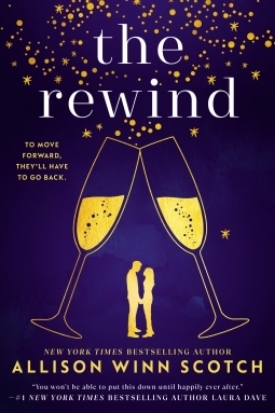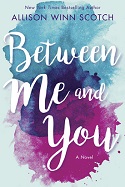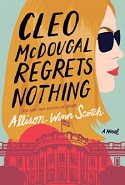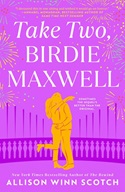 Synopsis:
Synopsis:
College sweethearts Frankie and Ezra broke up on the day they graduated, vowing to never speak to each other again.
Ten years later, on the eve of the new millennium, they are back on their snowy, picturesque New England college campus, together for the first time since their breakup for the wedding of mutual friends. Frankie’s career as a music manager for some of the hottest bands of the late ’90s is on the rise. Ezra is determined to propose to his girlfriend after the New Year’s Eve wedding but before midnight.
Everything is going according to plan. They just have to avoid getting lost in the chasm of emotions churned up when they inevitably come face to face.
But they wake up in bed next to each other the following morning. Ezra’s grandmother’s diamond ring is on Frankie’s finger. And neither of them has any memory of how they wound up there . . . or any of the events that transpired the evening before.
Now Frankie and Ezra have to put aside their old grievances in order to figure out what happened, what didn’t happen . . . and face the most troubling question of all: what if they both got it wrong the first time around?
Review:

Allison Winn Scotch is the New York Times bestselling author of eight previous novels, including The Song Remains the Same, Time of My Life, In Twenty Years, Between Me and You, and Cleo MacDougall Regrets Nothing.
During the COVID-19 pandemic, Scotch was sheltering in her Los Angeles home with her husband and two children. She hadn’t written a word for nine months, and was “listless and depleted,” evaluating ideas for books that failed to resonate with her during “endless quarantine walks.” She recalls she was “just spit balling” because “I felt like I needed to start writing something. She recalls taking one “long walk up my neighborhood hill because I was desperate to get out of the house” during which “a spark of any idea” came to her. A man and woman whose college romance did not work out are reunited when they attend a mutual friend’s wedding. They wake up in bed together with no memory of how they ended up there but have to figure it out quickly because it is New Year’s Eve 1999. She instantly knew that drafting the book would be difficult and says, “Indeed, it was very, very hard.” One of the challenges was balancing three different time periods: ten years earlier, the previous night, and the present day. Aside from Between Me and You, it was the most daunting project she has undertaken. She credits her agent with making her continue writing “when I endlessly complained I couldn’t do it.” It’s a good thing she did, because she recalls that the book was also a lot of fun to write. The Rewind is arguably Scotch’s best work to date.
Frankie Harriman has made a name for herself in the music business, primarily for managing the most successful female band. At thirty-two, she lives in Los Angeles, but travels extensively with the acts she manages, and has not been involved in a serious relationship since she and Ezra Jones broke on the day of their college graduation. When she was just five years old, her parents discovered she was a talented musician with perfect pitch when she played “Bridge Over Troubled Water” after hearing the tune emanating from the record player. Frankie didn’t understand how she did it. She just knew that she saw the notes in front of her the same way she saw colors. And she instinctively knew what key she was playing in. She spent her New York City childhood practicing the piano four hours per day to prepare for competitions, learning to master her nerves and perform with confidence. Her parents fully expected her to enroll in a college with a prestigious music program, but by the age of seventeen she was done. She simply did not want to pursue being a pianist any longer, even though she knew her parents and teachers would be devastated. She wanted to at last control her own life and destiny. Her parents only acceded to her wish to attend quaint Middleton University because the Steinway family had recently underwritten the cost of the school’s new auditorium. Frankie kept her musical past from her college friends, instead choosing to pursue a career helping other artists succeed in the music business. But recently she impulsively purchased an upright piano and had it delivered to her apartment. She has not played it . . . yet.
What was the point of loving someone if they refused to see the entirety of you?
Ezra’s father abandoned his wife and two sons, and Henry, his brother, was much older and left home when Ezra was very young. So growing up, it was just Henry and his mother on their own. Ezra cared for her as she battled ovarian cancer, a fight she lost after graduation. He was a studious, rule-follower destined for law school. But he ended up making a lot of money in the tech industry. Now he has come back to Middleton for their friends’ wedding, intent on proposing to his perfect girlfriend, Mimi, who works for a dating start-up (Datify.com) and loves grand gestures as much as he does, before the stroke of midnight. He even had “12/31/99” engraved in the ring that once belonged to his grandmother.
Frankie and Ezra have checked into their respective hotel rooms and steeled themselves for their inevitable reunion at the rehearsal dinner to which Ezra is headed when the elevator stops. The doors open and there is Frankie in the hotel hallway.
The next thing they know, it is the morning of December 31. Frankie awakens with a splitting headache next to a naked man in a room she doesn’t recognize (which, truthfully, isn’t all that unusual for her which is one of the reasons she quit drinking two months earlier). She screams when she realizes that she is in bed with Ezra and they are in the dorm room in which he resided during their freshman year – before they met. Ezra’s grandmother’s ring is stuck on Frankie’s finger and Ezra is wearing a wedding band on his left right finger.
Why? What happened last night and how did they end up sleeping in a dorm room another student now occupies? Did Mimi ever arrive, as planned? About they only think they agree on is that they have to find out what happened. So they embark on a frequently hilarious quest back to the bar where they both apparently had drinks and various campus locations, gathering clues about the prior evening’s events. Along the way, they argue and fret about the best approach and what steps they should take in search of answers. First, they have to evacuate the dorm room when its very angry current resident returns and finds they slept in her bed. As the day wears on, they trek to the school library, gymnasium, and Steiner Auditorium, discussing their relationship in the process. Their banter is believable, funny, and, as the story proceeds, touching.
Scotch deftly transports readers back to 1999, a time when cell phone functionality was limited to actually making calls and texting. So even if they could find their cell phones, Frankie and Ezra can’t just Google the name of the bar to find out what time it opens. They have to walk there. And Ezra has to deal with the slow dial-up connection to the internet in order to check the airline’s schedule and learn if Mimi’s flight was delayed or canceled. Frankie finds herself negotiating with that dorm resident to get her Walkman back because it contains the rough cut CD of her girl band’s new album. And, of course, there are references to fashion (Frankie wears Doc Martens, of course).
And as Frankie and Ezra gather clues, Scotch reveals their relationship history and what propelled them to break up in such a spectacularly final fashion. She also examines all the ways in which their personalities and quirks differed, how they responded to those differences and supported each other during their relationship, and, most importantly, how they have matured and grown in the years since.
Frankie always reminded Ezra “of a tornado: always in motion, occasionally a thing of beauty too often destructive.” They were “combustible.” Still, they never fought. Ezra suffered from panic attacks that Frankie was able to help him through – although, coincidentally, he has not had one since he and Frankie broke up — and never had a one-night stand because he believed in monogamy and commitment, and wanted a relationship, not just sex. Ezra unexpectedly finds himself re-evaluating his relationship with Mimi as he is reminded of all the reasons why he loved Frankie so much. He is stunned to find that he has loved “two women so wildly different.” He always avoided confrontation and let Frankie make choices for him. He has been enjoying a “seamless life, one uninterrupted by drama” with Mimi. But is it really enough?
Franke never mourned losing Ezra, their relationship and the possibilities it held, or making music. Rather, she graduated, moved to Los Angeles, and got busy with her career. “It was easier to move on, to force her way through.” Her life has been a whirlwind, but now she realizes that unresolved pain remains until it is confronted. She is shocked by the real reasons he never practiced law because they seem out of character, but observes changes in him that remind her their relationship “was the most solid thing that she’d ever held on to her whole life through.”
The Rewind moves along at an unrelenting pace as Frankie and Ezra confront both last night and the things that tore them apart a decade ago. Scotch finds just the right balance of hilarity and poignancy as her two relatable and likable lead characters unexpectedly find themselves on a journey of reflection and self-examination. The histories Scotch has concocted for them seamlessly and credibly inform the two people in their early thirties who need to solve a mystery – and quickly – if so that they can get on with their lives and all that they have planned. Or . . . maybe not? Perhaps after all that they have learned about each other and themselves in the process of finding out what mischief they got into last night, their futures might look very different.
Scotch says she enjoys “capturing that time in your life when you were on the open road and anything was possible. I love exploring that and the dichotomy of getting older.” With The Rewind, she again proves how adept she is at melding comedy with introspection into a thoroughly entertaining, enjoyable, and, ultimately, heart-tugging and thought-provoking story. There are moments when the tale is nothing short of heart-breaking. But Scotch clearly worked through any difficulties or complications she encountered while crafting the story about two people who are presented with an unexpected second chance at love and happiness. The narrative zips along seemingly effortlessly to a thoroughly satisfying and not entirely predictable conclusion.
Excerpt from The Rewind
ONE
Frankie
Frankie awoke to a headache that felt akin to a leech sucking the blood straight from her spinal cord. The throbbing started low in her skull, right at the nape of her neck, and reverberated out with each heartbeat, each pulse, into every vein, every cerebral fold, every nerve. She squeezed her eyes closed, willing for sleep for one more moment, but the pain was unbearable, too much to allow for rest to settle back in. This, certainly, was one of a hundred hangovers she had endured, and yet this one felt different. Harrowing.
She allowed her eyes to flutter open and found herself staring at a white wall. To be sure, this was not the first wall she had woken in close proximity to, but certainly, she knew immediately that it wasn’t her own. She’d painted one of her bedroom walls a vibrant purple last year, and though all her friends in LA thought it was a little much, Frankie had yet to grow weary of it, unlike so many other things in her life. (Really, she only had, like, three friends in LA, and mostly, those friendships were work friendships, but still. They really all did think she’d get sick of the purple wall.)
Frankie rolled to her back, emitted a groan, and noticed a heat emanating from beside her. The naked back of a man rose and fell next to her. This was also not a highly unusual experience for Frankie, who often took advice from Prince and partied like it was the end of the world, or at least the end of the century. Who could blame her: hot men and tequila went with her business.
This morning, however, Frankie narrowed her crusty eyes and took stock. The room was dim, the shades still pulled, and low light filtered in. The bed was small, very small. True, she occasionally woke up in a shabby studio with an aspiring drummer or the like (Frankie did prefer drummers, as they knew what to do with their hands; guitarists were pretty all right, too), but as adults, nearly everyone had at least a decent-sized bed. Sometimes, yes, there were futons involved. She rarely even bothered to give those aspirings her number. Futon-guys were fun, but they were not on Frankie’s long-term radar. Laila would argue that Frankie didn’t have long-term radar, while April would urge Frankie to find her long-term radar. “It’s very fulfilling once you do,” she’d once said, while Frankie made groaning noises over the phone that she hoped April could interpret three thousand miles away.
Frankie pushed up to her elbows and glanced around. The furnishings were . . . She tried to place them. The furnishings were familiar but only in a vague, back-of-her-mind way. They were utilitarian, basic, standard-issue beige wood. Frankie squinted, her brain running in the way that it sometimes did before she either had a brilliant epiphany or needed to take an Ativan.
This did not seem right. This did not feel right, and if Frankie Harriman was good at anything, it was tapping into a feeling and riding that wave. That’s how she discovered Night Vixen in a dank club off Sunset and brought them from bickering post-high school na•fs to the A-lister girl band who currently had the number two record and five singles on the charts. No small thing for a girl band in the late ’90s, when- despite the success of, well, Frankie would just say it: ugh, the Spice Girls-girl bands still had to fight for both respect and airplay. It was how she’d navigated the boys’ club of her industry and landed on Hollywood Reporter’s 30 Under 30 at twenty-eight: by tapping into feelings about up-and-comers and massaging egos and wiping tears and sending ridiculously large bottles of champagne to front doors when a single got its first spin on 102.7 KISS FM.
This morning, with alarming and rapid acuity, Frankie realized that her feelings bleated, Something is not right.
Gingerly, she eased closer to the man beside her, craning her neck until she hovered just above his face.
She recognized him both too slowly and too quickly, in the way that you might when you slam on your brakes before you hit a biker who runs a light. How quickly you react determines everything that comes next. An adrenaline rush but nothing except tire marks in the street or a man dead in the crosswalk. Half a second makes all the difference.
Frankie Harriman, who was accustomed to finding herself in plenty of oncoming traffic, did not react well. She stared at the stubble and the chestnut hair and the long eyelashes and the straight nose, and she screamed.
TWO
Ezra
Ezra woke to someone screaming, so loud, too loud. Oh God. Why was it so loud?
“Stop,” he mumbled, his eyes still closed. “Stop.”
The screaming abated, and he curled into the fetal position, tugging the sheets closer. A tug back. He yanked in reply and cocooned himself further in the bed.
Then, an unwanted poking at his hip. Poke. Poke. Poke.
He groaned and exhaled, his eyes still shut.
“You,” he heard, and felt hot breath in his ear. “You!”
Now his eyes were open, and he took a sliver of a beat to process where he had unceremoniously woken.
A dorm room? His brain discarded the notion. Then revisited it.
He tilted his head up an inch from the pillow. No, this was definitely a dorm room.
His heart accelerated in a way he could feel acutely in his chest. Did he actually go home with a college student last night? He did the math: while one hundred percent disgusting, it would not be illegal. Ezra had gone to law school and knew that while there were plenty of things that were unsavory, they could not land you in prison.
He felt the finger pressing his hip again. Please don’t be eighteen. Please be clothed. Please be Mimi. Please please please be Mimi.
“You! What are you doing here?” From behind him. And then he instantly knew the voice; he’d heard it a million times back when he was young enough to live in a dorm room. In fact, when he did. When she did. Their junior and senior years. They’d lived together even if it hadn’t been official.
Oh shit. It hadn’t occurred to him to plead for a reprieve from Frankie Harriman because never in ten billion years-no, more than that-would it have occurred to him that she could be the woman next to him.
He didn’t want to turn around to face her, and yet, it appeared to be too late to slink out unnoticed, to leave a note and a promise to call. Not that Ezra had ever done such a thing even once in his life. He was a Big Brother. He spearheaded a free legal aid group in law school. He was a monogamous commitment-fiend who’d never had a one-night stand because he valued the relationship, not just the sex.
He steeled himself before he turned to face her. How he’d ended up in a twin bed in a dorm room with Frankie Harriman was truly beyond him at the moment. But turn he must.
So he did.
And she screamed again.
And he, startled at both the decibel and the proximity of her face for the first time in ten years, screamed back. Louder. Louder. Because he’d vowed the last time he’d seen her that she would never get the better of him again.
THREE
Frankie
What are you doing here?” Frankie shrieked, pushing her palms flat against Ezra’s bare chest, then pulling them back as if she incurred an electric shock. “Why are you in bed with me?”
Her head throbbed with each syllable, so she quieted and waited for what she hoped was a suitable explanation. How could there be a suitable explanation? She had pledged never to speak to him again, never to think of him again, and now, here they were, skin to skin, tucked under his sheets as if they still knew each other in the ways that they used to.
She watched Ezra blanch and swallow. He scrunched his face, a habit from back in the time when they were crazy in love and he was tackling an Eastern European history paper or a group project he’d wind up doing the bulk of the work on. A decade ago, she found this perplexed look endearing. Now, its breezy intimacy made her ill. But that could have been the hangover too. How could he be so familiar to her, so exactly the same?
Of course, Ezra had grown up (she heard things, ok?)-law school, Manhattan, last she’d been told. But she hadn’t really kept up with him over the years. Had never once been tempted to seek out his phone number, had never whiled away late evening hours (even when tipsy) in an AOL search spiral. When she and Ezra split the day of their graduation, Frankie put it behind her entirely. She had barely given a second thought to Ezra Jones, except to occasionally consider how much she hated him, how deeply he had offended her, how gravely he had misunderstood her. That was the one that really stung. That after two years, he’d gotten her all wrong.
Of course, Laila and April occasionally couldn’t help themselves-April would mention that Connor had crashed with him for a boys’ weekend in New York; Laila would say that she heard he was single again, as if Frankie had known that he wasn’t single in the first place. There was one trip to New York about five years after graduation when the record company put Frankie up at the Gramercy Park Hotel, so Laila had come up from North Carolina and April had trained down from her graduate studies in Boston, and they were at the lobby bar, and Laila gasped and said, “Holy shit, is that Ezra?” And Frankie froze like a cornered animal, her adrenaline seizing her intestines, and then Laila said, “Oh, no, my bad, not him,” but Frankie was already shaking. Later, they were tipsy and flopped on the king bed, and Frankie said, “Guys, please, I don’t want to hear his name again, like, ever, ok?” And she saw a look pass between them, but they nodded all the same. That’s how Frankie did it, that’s how she organized her life, and that’s how she left Ezra Jones behind. By any means necessary.
Now, Ezra’s face unwound, and he hiccupped, his breath smelling like day-old alcohol. Then his features comported themselves again. He didn’t look much different than he had back in college, Frankie thought. His cheeks had shed the last of their baby fat, and his stubble was fuller now, as if he really could grow an actual beard, which had seemed just out of reach at twenty-one. But he was still boyish, his dark eyes still protected by full lashes, the line of freckles that ran from his left eye to his ear still prominent and shaped like the curve of a moon.
Frankie remembered running her fingers over that curve, awed by the perfect crescent on what she used to think was a perfect face. Though she hated to acknowledge it, even under the veil of sleep and in need of a shower, Ezra Jones was beautiful.
“Why are you in bed with me?” Ezra responded, bringing her back. “And what . . . I mean . . . Are we in a dorm room?”
“A dorm room?” Frankie snapped. “I’m staying at the Inn. Why would we be in a-”
She stopped, as something clicked into place. The beige furniture, the vague familiarity, the generic blandness of it all. They had, indeed, inexplicably landed in bed together in a dorm room. If this were a rom-com, someone in the audience would squeal. This was not a rom-com, however. Neither of them squealed. Both of them were horrified.
Frankie arched and tilted her head back. The wall behind them was covered in posters. The Backstreet Boys. The Cranberries. Nirvana. Night Vixen. (Hooray, Frankie thought, despite everything else.)
“Yeah,” she said. “I guess this is a dorm room. What the fuck.”
She thought about pointing out that her clients were on the wall above them but decided she didn’t care about impressing Ezra. She regretted that she even had the instinct to impress Ezra Jones.
“Did we . . . ?” Ezra gestured back and forth between them. “I mean, do you remember what happened? Like, with us? Was there-”
“Oh my God, no!” Frankie said, though she honestly had no idea if they did or didn’t. She sure as shit hoped they didn’t though. Frankie had a motto that if something was over, it was over, which wasn’t to equate that motto with the fact that she had zero inkling of what happened last night. Still, it felt more solid, more concrete to simply rule it out. “No,” she said again. “For sure not. We did not.”
She ran her hands down to her waist. She still had on her underwear, so that was . . . promising. She raised the sheets and sighed: though Ezra’s flannel shirt was flung to the floor, he was also still in his jeans, although his belt, disturbingly, was undone.
She focused on the positive: “Your belt’s still on,” she said. “And I’m in my tank top. I’ll take that as a good sign.”
He stared at her for a beat, as if he were going to argue, but instead, let it wash over him.
Well, well, Frankie thought, a little annoyed that he didn’t take her bait, a little relieved too. Back then, he’d rarely pushed back, and they’d never argued. Until they finally did in the archway of Burton Library on a clear day in May when their divide became a crevasse, when she’d said goodbye to Ezra forever and didn’t lay eyes on him again until now.
“Are we in Homer?” Ezra asked. “Doesn’t this look like Homer?”
Homer. Their freshman dorm.
Frankie screwed up her face into something that she hoped connoted: That’s the dumbest thing I’ve ever heard. Inarguably, Ezra was almost always the smartest person in the room-he’d gotten a full merit scholarship to Middleton and was easily the brains of their group, so she never minded one-upping him when she had the chance.
She wanted to prove to him that she’d grown up too. And yet, she heard herself saying:
“How would we be in Homer?”
Ezra rubbed his eyes. “I don’t remember anything from last night.”
Frankie considered this. To be honest, she didn’t either. She remembered getting ready in her hotel room; she remembered getting a call from Laila; she remembered-a jolt ran through her-locking eyes with Ezra as the elevator door closed. But then, well, she tried to find the rest of the night somewhere hidden in her cerebral folds. Nothing. There was nothing else there.













Comments are closed.